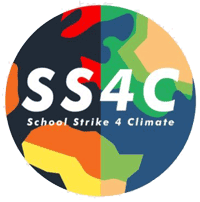Contact details for the BMCS Sustainability & Climate Change Officer are on our Society Office Holders webpage
This section contains information about specific BMCS climate change campaigns.
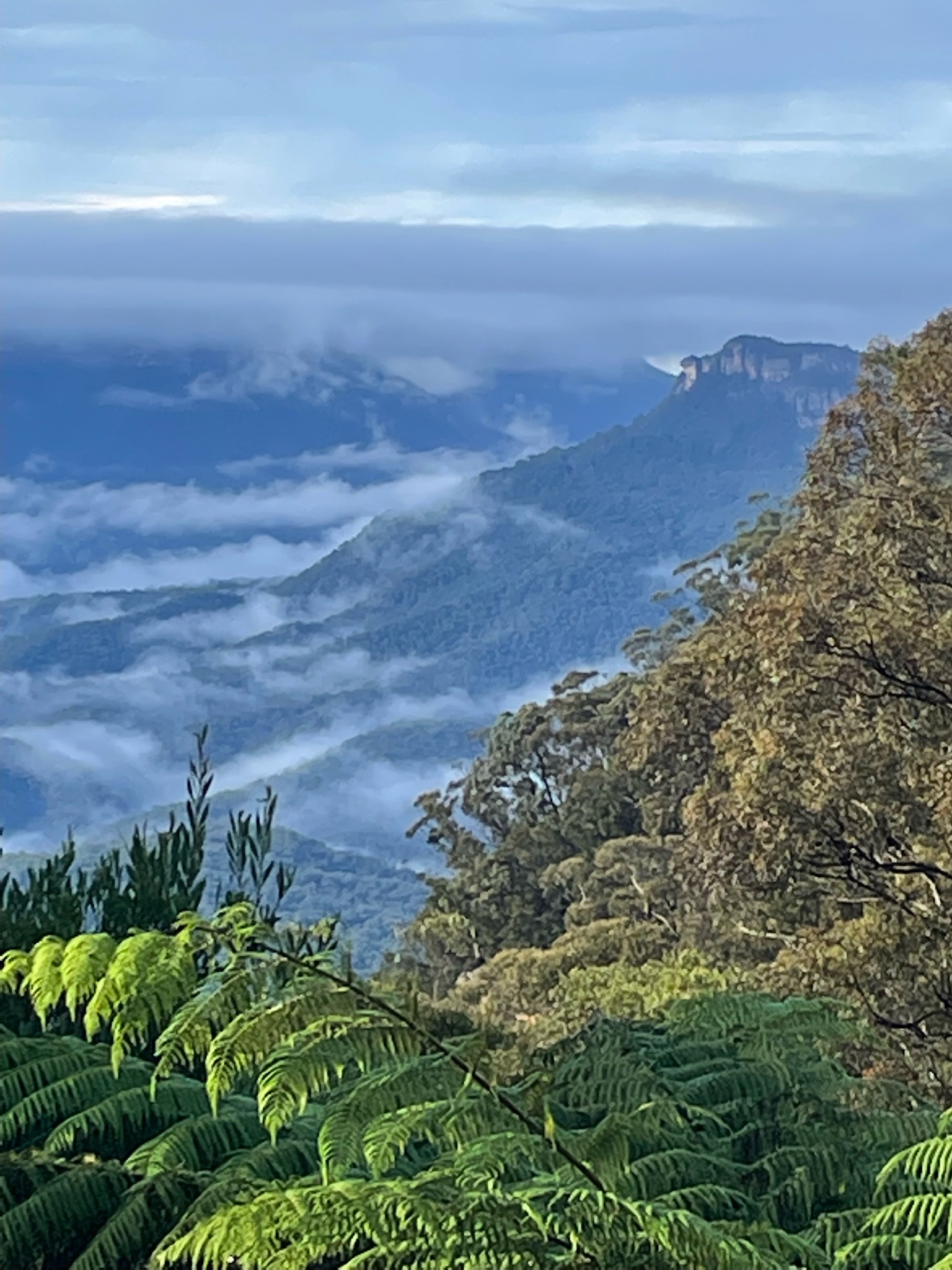 Jamison Valley (Ann Penhallurick)
Jamison Valley (Ann Penhallurick)
What if you could have your expensive-to-run gas appliances replaced with a stand-alone solar system and not be out of pocket?
What if Blue Mountains City Council (BMCC) agreed to cut gas from Council's buildings and refused new gas connections in the BMCC area?
What if NSW councils banded together to pressure the State Energy Minister to fast track a path out of polluting gas across NSW?
Sounds too good to be true? Already other local governments across the country are making these changes and seeing the benefits.
Join the Blue Mountains Conservation Society in calling on BMCC to power up and take up the Ready for Renewables challenge to make positive changes that benefit your home, local small business and the planet.
Encouraging BMCC to participate in the Ready for Renewables Council challenge is easy.
Action: Simply email BMCC councillors and ask them to take up the challenge and commit to taking these three steps.
- Refuse new gas connections - request planning scheme amendments of the state planning minister
- Phase gas out of Council's buildings and urgently replace all gas use with renewable electric appliances, particularly heavy users like heating water for swimming pools
- Write to the State Energy Minister and urge for the State to plan a way out of gas use as a critical priority
Tools:
- Use or adapt the email template: PDF version; Word version
- We suggest that you direct your email to all BMCC councillors: PDF version; Word version
This section contains views and opinions by Society members about climate change.
What do native grains have to do with gas? Well, competing for the same land for one!
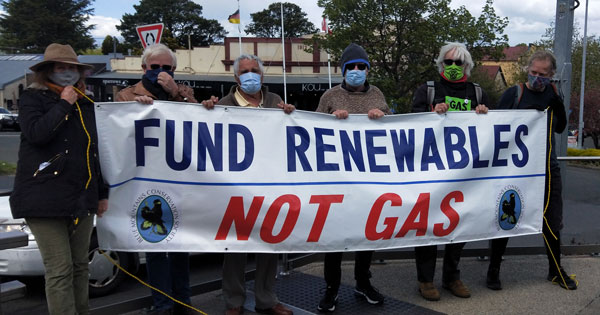
But wait, why else has Narrabri been in the news lately? Oh yes, the NSW government has recently approved Santos’ Narrabri Coal Seam Gas (CSG) Project which will add an estimated 500 million tonnes of additional greenhouse gases into the atmosphere.
Among many other disastrous impacts, CSG mining will take massive amounts of water that could be used for farming and the environment and in the process threaten the integrity of the artesian basin in this area, as well as producing the by-product of solid waste salt.
Prime agricultural land that could flourish as a site for growing native grains will instead become a polluted wasteland.
However, the battle to stop the Santos project going ahead is not over yet, go to Lock the Gate or CSG Free North West for more information.
Meanwhile, in our fossil fuel crazed country, the ACT is phasing out the use of gas, while the Federal Government is promising a gas-led recovery. This is in direct contradiction to the advice by leading Australian scientists who wrote to the Chief Scientist in August, 2020 pointing out that a gas-fired future – “is not consistent with a safe climate nor, more specifically, with the Paris Agreement. There is no role for an expansion of the gas industry”.
This was followed by a run of articles with titles such as ‘4 reasons why a gas-led economic recovery is a terrible, naïve idea’; ‘The 'gas-led recovery' isn't economically or environmentally prudent’; Critics say Scott Morrison's new power plan is a recipe for 'gas-fuelled climate collapse' and ‘Australia must place climate action at centre of coronavirus recovery, chief UN economist says’.
Some of the main points from these articles are that:
- Gas is actually a high emissions fuel. If Beetaloo Basin (NT) alone is opened up this will create 114 million tonnes of CO2 emissions annually — almost a quarter of Australia’s current total yearly emissions.
- Gas is not a necessary transition resource because of the unprecedented increase in renewable technology and storage capacity.
- Natural gas primarily consists of methane. It’s estimated that over 20 years, methane traps 86 times as much heat in the atmosphere as carbon dioxide.
- Unconventional gas projects damage forests, wildlife habitat, water quality and water levels because of land clearing, chemical contamination and fracking.
- Fossil fuel demand is decreasing rapidly across the globe and Australia could end up with many stranded assets through investing in gas infrastructure.
We need to stay vocal on this issue. The evidence is against a ‘gas-led recovery’ and for a renewables future.
As Elliott Harris, UN chief economist states: “What we’ve seen in this COVID crisis is that governments are indeed capable of really ambitious, rather unorthodox, extremely important and even massive interventions… I can think of no stakes that are higher than the climate crisis that we are living in right now."
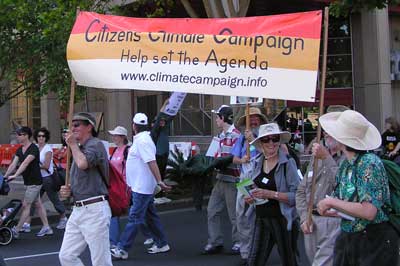 Walk Against Warming in 2007 (Alan Page)
Walk Against Warming in 2007 (Alan Page)
(click the image to see a larger version)
We prepared emails for the Campaign's 1,000+ supporters to send to State and Federal Parliamentarians.
One of our sayings was -
I then worked with the late Sue Morrison on Katoomba Climate Action Now.
In 2009, I met Tara Cameron, then President of the Blue Mountains Conservation Society, and the rest, as they say, is history.
For decades we have fruitlessly tried to influence our parliamentarians to accept climate change and act. But there comes a point when you realise that stern emails, letters and peaceful rallies aren't working. Then what?
This article in The Age newspaper explains why I support Extinction Rebellion.
The following video also sums it up well - but be warned, it has several expletives. The Extinction Rebellion Returns
There's more information about Extinction Rebellion below
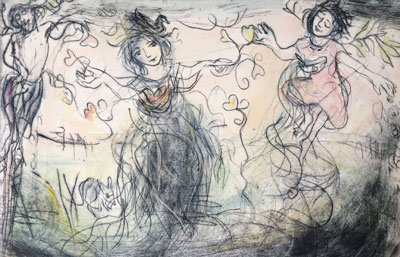 Artwork by Cate Dudley
Artwork by Cate Dudley
In 2018, Professor Jem Bendell published a paper titled Deep Adaptation: A Map for Navigating Climate Tragedy. Despite its premise that we are heading for societal collapse the paper went viral and has been the basis of rich conversations across many activist, academic and concerned citizen forums. I can only give a sense of the paper here, so if this triggers any interest for you, please explore it further at the links below.
The paper draws on research into climate science to argue for the high probability that the impact of disruptive climate change will cause near term societal collapse, across all countries and socio-economic levels. Consequently, Jem Bendell argues that we need to consider how we can ‘deeply’ adapt to this in a way that confronts this collapse as a reality. He acknowledges the grief that arises in this approach, and he recognises that people argue that such a vision of the future is not helpful as it can cause feelings of hopelessness. However he argues that communicating with others from this viewpoint, liberates creativity and builds collaboration and community in ways that cannot occur when we are repressed by denial. This also enables us, he says, to ‘ relax into our hearts, notice the impermanence of life, and let love for this momentary experience of life in all its flavours flood our being and shape our next steps’.
Jem Bendell describes Deep Adaptation as a philosophy, framework and range of initiatives aimed at reducing harm in the face of societal collapse. Part of this approach is the development of the ‘Deep adaptation agenda’ which he suggests can be a useful framework for community dialogue in the face of climate change. This is based on four ‘Rs’: Resilience: how do we keep what we really want to keep? Relinquishment: what do we need to let go of in order to not make matters worse? Restoration: what do we bring back to help us with the coming difficulties and tragedies? Reconciliation: What could we make peace with to lessen suffering?
As you can imagine there have been hugely varied responses to this paper, one of which was a funding grant to establish the Deep Adaptation forum where you can read about this in much greater depth. Others, such as author Jeremy Lent strongly critiqued the paper arguing the need for Deep Transformation rather than adaptation.
For further exploration of these ideas have a look at:
- Professor Jem Bendell
- Deep Adaptation Forum
- Jem Bendell in conversation with Joanna Macy
- Extinction Rebellion in conversation with Jem Bendell
- This stimulating article titled ‘Our evolutionary moment’ was prompted by Jem Bendell’s Deep adaptation paper.
This section contains articles and news about climate change.
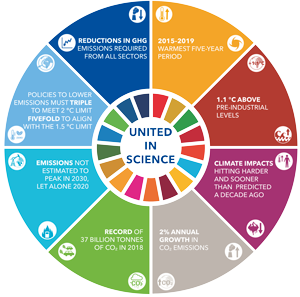 United in Science Key Message Circle
United in Science Key Message Circle
(click the image to see a larger version)
It underlines the glaring – and growing – gap between agreed targets to tackle global warming and the actual reality.
The report, United in Science, includes details on the state of the climate and presents trends in the emissions and atmospheric concentrations of the main greenhouse gases.
It highlights the urgency of fundamental socio-economic transformation in key sectors such as land use and energy in order to avert dangerous global temperature increase with potentially irreversible impacts.
Highlights from the report include:
- Warmest five-year period on record
- Continued decrease of sea ice and ice mass
- Sea-level rise is accelerating; sea water is becoming more acidic.
This section contains links to organisations whose aim is to provide information about climate change and related issues, as well as actions that can be taken.
Our Demands:
- Tell the truth about the current situation
The Government must tell the truth about how deadly our situation is, it must reverse all policies not in alignment with that position and must work alongside the media to communicate the urgency for change including what individuals and communities need to do. - Reduce carbon emissions by 2025
The Government must enact legally-binding policy measures to reduce carbon emissions in Australia to zero by 2025 and take further action to remove the excess from the atmosphere. It must cooperate internationally so that the global economy runs on no more than half a planets worth of resources. - Beyond Politics
Government must create and be led by the decisions of a Citizens’ Assembly on climate and ecological justice
We are school students from cities and towns across Australia. Most of us have never met in person before but are united by our concern about our planet.
We are striking from school to tell our politicians to take our futures seriously and treat climate change for what it is - a crisis.
Politicians can show us that they care by taking urgent action to meet our demands:- Move beyond coal mines
- No new coal, oil and gas projects
- 100% renewable energy by 2030
Here's the School Strike for Climate Facebook page
Move Beyond Coal is an unstoppable community movement to solve Australia's biggest contribution to the climate crisis. We are working to protect a liveable world for people and nature everywhere by stopping coal expansion, and phasing out coal by 2030.
We’re calling on the Port of Newcastle to stop the coal ships from dawn Saturday November 29 to dusk November 30, when thousands will gather for Australia’s largest disruptive climate protest.
The Port of Newcastle exports more coal than any port on Earth, shipping out hundreds of thousands of tonnes of coal every single day. It cannot continue business-as-usual whilst climate disasters escalate and there is no plan and no funding to secure jobs beyond coal.
We are a network of community members, climate change activists, sustainability and environment groups in the Blue Mountains. We have a vision for a connected, vibrant, and resilient community caring for a healthy, sustainable Blue Mountains.
Here's the Resilient Blue Mountains Facebook page
Each of us has felt the devastating loss brought about by bushfires – whether it be a home, cherished mementos or our sense of safety and peace of mind. But from these devastating origins, we have discovered strength, and our voices. We have forged a vibrant and diverse community of survivors who share an unwavering commitment and determination to end the mining and burning of fossil fuels for the safety and well-being of all communities.
Here's the Bushfire Survivors for Climate Action Facebook page
350.org Australia aims to rapidly end fossil fuels by building a global climate movement.
We believe that a global grassroots movement can hold our leaders accountable to the realities of science and the principles of justice.
The movement is rising from the ground up all over the world and is uniting to create the solutions that will create a better future for all.
350.org Australia is a not-for-profit project helping build this movement from our corner of the globe.
The Australian Youth Climate Coalition is Australia’s largest youth-run organisation, our mission is to build a movement of young people leading solutions to the climate crisis.
Young people have the most to lose from global warming, but we also have a lot to gain.
Climate change is our best opportunity to create a world that works for everyone, not just a few.
We can power our lives with the wind and sun, and ensure access to clean energy and job opportunities for all.
We are a network that supports our members and their allies to take actions to protect people at home and abroad from climate change, to safeguard our natural environment, and to build a fair, clean, healthy Australia for everyone.
The Climate Council is Australia’s leading climate change communications organisation.
We provide authoritative, expert advice to the Australian public on climate change and solutions based on the most up-to-date science available.
The Lock the Gate Alliance is a national grassroots organisation made up of over 120,000 supporters and more than 450 local groups who are concerned about risky coal mining, coal seam gas and fracking.
These groups are located in all parts of Australia and include farmers, traditional custodians, conservationists and urban residents.
Project Drawdown is a world-class research and communication organization which serves as a non-partisan, non-commercial, highly-trusted source of solutions to reverse global warming.
Project Drawdown is shifting the larger global conversation on climate change from “doom and gloom” to a sense of opportunity, possibility, and hope for the future.
We share climate solutions with the world through our best-selling book, public presentations, and content.
We collaborate with media and non-profit partners to further spread our messages to global audiences.
The Intergovernmental Panel on Climate Change (IPCC) is the United Nations body for assessing the science related to climate change.
The IPCC provides regular assessments of the scientific basis of climate change, its impacts and future risks, and options for adaptation and mitigation.
We acknowledge the traditional custodians of this land
the Darug and Gundungurra people
and pay respect to their Elders past and present.

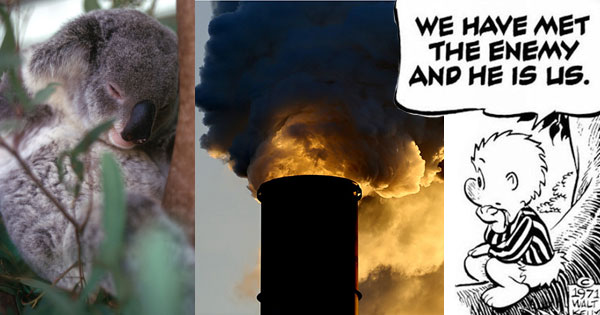 Koala, Smoke Stack and Pogo (Anon, Climate Council and Walt Kelly)
Koala, Smoke Stack and Pogo (Anon, Climate Council and Walt Kelly)
